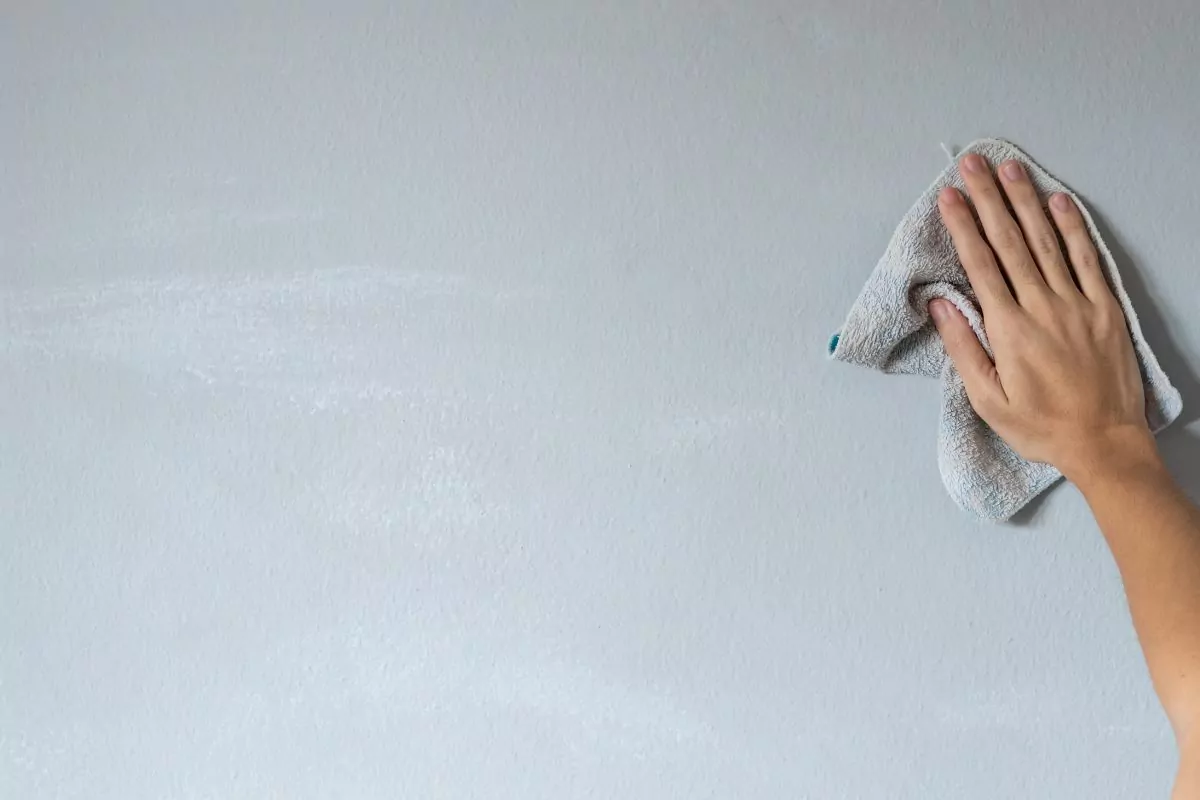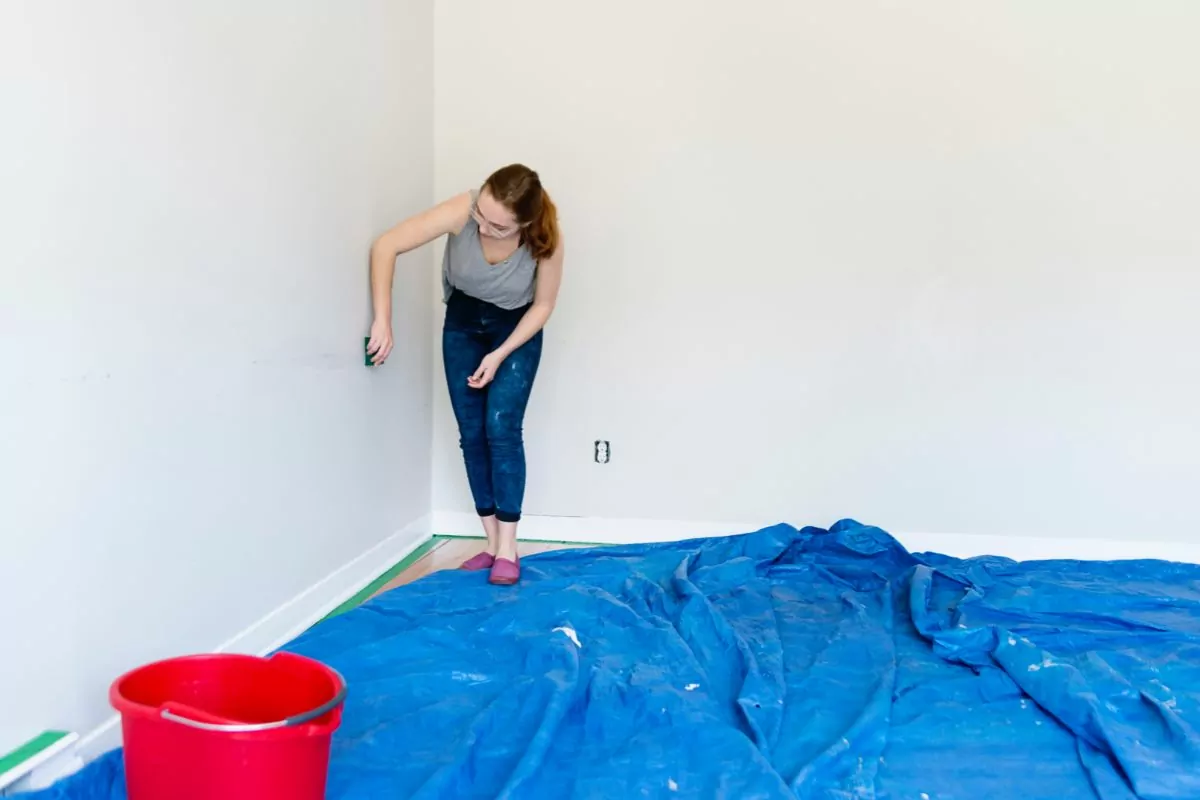When painting your walls, it’s important to have a clean base for the best results.
Instead of troubling yourself with buying industrial chemical cleaners, you can simply use a water-vinegar solution to easily get the job done.

The acidity of the vinegar is great for removing tough interior stains and dirt, making it the perfect natural organic cleanser for your home, office, or any other wall.
So, before you pick up a paintbrush, follow this step-by-step guide on how to prepare your walls for painting using vinegar!
Benefits Of Using Vinegar
Vinegar may not be the first thing that comes to mind when cleaning your home walls, and for good reason – it usually goes on your food!
However, its natural acidic properties make it a fairly powerful cleaning agent.
Below, you’ll find some benefits of using vinegar to wash your walls:
- Removes oil, grime, and dirt, and can dissolve mineral deposits from any surface.
- It can help kill and clean off any harmful substances.
- In a home study conducted by GotAbout, they found that vinegar is healthy and organic when used in the home environment.
- Unlike store-bought chemical cleaners that can leave you with a harsh, unpleasant odor, vinegar is not only organic and a good cleaning agent but the odor fades away quickly.
- Additionally, vinegar is very cheap yet effective, making it budget-friendly!
From looking at some of the above-mentioned benefits; there is no reason not to use vinegar!
Some Pre-Washing Tips
- Add essential oils – The smell of vinegar can be overpowering for some when applied over large surfaces such as a wall. To combat this, consider adding a few drops of mint, lavender, lemon, or any other of your favorite essential oils to try and mask the odor. This will leave your room smelling fresh.
- Don’t use color – What we mean here is that you should avoid using colored sponges or cloths when cleaning your walls since the color can sometimes transfer. To avoid this issue, stick to white sponges and cloths.
Will Vinegar Damage Painted Walls?
Before applying the vinegar, test the solution on a patch of wall.
While vinegar is generally safe to use, it’s important to see how it would react with a hidden portion of the wall before proceeding.
Therefore, it’s better to be safe than sorry; you’ll never know how the vinegar will react to a particular paint.
Getting The Room Ready
There are a lot more steps that go into cleaning your walls than some people are led to believe. For some, it will be an easier process than for others.
For instance, if you have many wall decorations, you may find it more tedious than those who have little.
Although, regardless of this, there are a few things to keep in mind.
Follow these simple steps to get your room prepared for cleaning:
- Protect your floors – From expensive carpets to hardwood floors and everything in between, you’ll want to cover these areas using a drop cloth. It is almost inevitable that you’ll create spills or drips when cleaning. Therefore, protecting your expensive flooring is important.
- Open doors and windows – Even during the winter, it’s important to have adequate airflow when you clean. Although, if it is too cold to open a window, you can get away with using a fan, too.
- Unplug power cords – This ensures two safety precautions, one: you won’t trip over any long cords, and two: you won’t get electrocuted from the spilled cleaning solution.
- Remove decorations – Removing any wall decorations will make for a seamless cleaning process. This includes removing anything from your shelves, as well as moving furniture pieces away from the walls.
Prepare For Cleaning The Walls
As previously mentioned, you’ll want to remove any artwork or other decorations from your walls before you attempt to wash them with vinegar.
Likewise, it is a good idea to remove any curtain or other window coverings to prevent them from getting ruined due to spilled vinegar or paint.
While vinegar shouldn’t damage any furniture, you don’t want to take any chances. So, remove all furnishing away from your cleaning area.
If you need to remove any tape or adhesives from the wall, a razor blade should work perfectly.
Before cleaning, you’ll want to run a duster across your walls to remove any loose cobwebs or dirt.
This is easier to do when your walls are dry as opposed to being wet where the dust will spread.
Clean Your Walls With Vinegar
Vinegar is a great solution if you’re looking for something gentle enough to leave your walls intact but strong enough to remove gunk and dirt from your walls.
Follow these simple steps to wash your walls with a vinegar solution:
- Using equal parts vinegar and warm water, dilute the solution in a bucket. For extra cleaning strength, consider mixing in a few drops of dish soap.
- Take a cleaning cloth or a soft sponge, and gently wipe the walls down using the cleaning solution. Make sure you take care not to remove the paint since this could leave an uneven texture under your new paint.
- Once done, take a clean sponge or wash cloth and wipe the walls down again, using plain water, to remove any residual vinegar.
- Before you start painting, ensure the walls are thoroughly dry, otherwise, it could leave your paint blistering or it can promote mold growth.
Once your walls are clean and dry, you can go over and patch any noticeable damage or holes. Then, start painting!
Cautions

There are a few things to keep in mind when cleaning your walls with vinegar.
Following these simple steps will ensure you clean your walls safely and effectively:
- When using a ladder to reach high spots, ensure you have a helping hand available.
- Always remember to use protective gloves and goggles when cleaning.
- Since you will be working with vinegar, dust, and paint, it is important to wear a face mask.
- Avoid using a scraper. The acidity in the vinegar will remove any tough dirt and grime.
- Don’t forget to lay down plastic or paper sheets on your floor, ensuring every square inch is covered. This protects your floor from damage and mess.
Frequently Asked Questions
Sometimes, figuring out the best methods to clean your walls before painting can be difficult.
Therefore, below, we have answered some frequently asked questions when washing your walls with vinegar before painting.
What To Use To Wash Down Walls Before Painting?
Washing your walls before painting ensures that any dust, cobwebs, stains, or grime are removed and won’t interfere with the painting process.
Using equal parts combinations of vinegar and warm water, you have yourself an easy, durable solution to cleaning your walls.
Gently rub your walls in a circular motion, then rinse the solution with a clean cloth and clean water.
Is Vinegar Safe For Painted Walls?
For most types of walls, using a vinegar solution to clean your walls is perfectly safe.
Although, to be sure, make sure to test a hidden section of your wall – it’s better to be safe than sorry!
Does Vinegar Hurt Paint?
Whatever the surface, avoid letting your vinegar dry out. Instead, wipe it off with a clean microfiber towel as soon as possible.
For some paints, the use of vinegar can damage and dull the paint.
What Surfaces Should Vinegar Be Avoided On?
Below, you’ll find some surfaces on which you should never use a vinegar solution, these include:
- Marble and granite countertops (the acidity in the vinegar can etch the natural stone)
- Egg strains or spills
- Stone floor tiles
- Truly stubborn stains
- Hardwood floors
- Irons
Can You Use Vinegar To Clean Mold?
Yes! Simply pour some undiluted vinegar into a spray bottle, then spray directly onto the affected area.
Let it sit for at least an hour, then brush with a soft-bristled brush to remove the mold.
Final Thoughts
Instead of going out of your way and purchasing specialist wall cleaning products, why not simply use a natural vinegar-water solution?!
It works just as effectively; at a fraction of the cost. With equal parts vinegar and water, you have an easy product to prepare your walls for painting.
Hopefully, this guide has informed you on how to wash your walls before painting using vinegar.
- How To Drill Into Brick? - October 31, 2022
- How To Repair And Refinish Hardwood? - October 31, 2022
- Floetrol – What Is It? When To Use It: Complete Guide - October 31, 2022
